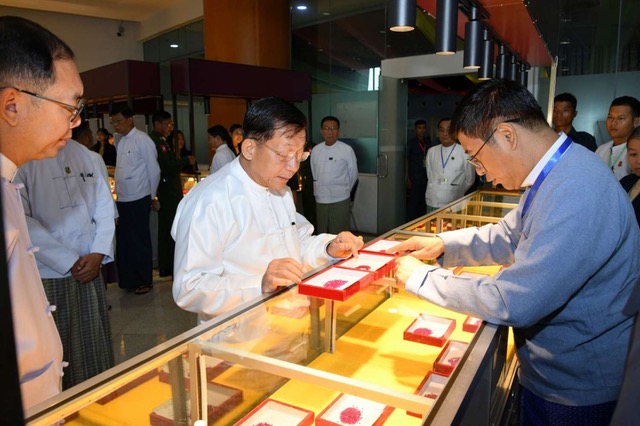Myanmar’s regime is holding a gems emporium, a major revenue earner for the junta, in Naypyitaw, selling more gems than previous events.
The current event has 300 lots of pearls, 160 lots of gems and 4,025 of jade on offer, compared with 295 lots of pearls, 120 lots of gems and 2,150 of jade in March.
The emporiums are normally held in March and September.
The floor prices are set in US dollars for pearls and gems and foreign merchants have to pay in dollars, euros, yuan or baht. Domestic buyers pay in kyats.
The finest jade is only sold in foreign currency, the second grade is also available in kyats for domestic merchants and the lowest grade is sold in kyats, purportedly to support independent enterprises.
When it organized an emporium in April 2021, two months after the coup, the regime sold pearl and gem lots in kyats but there has been an increasing interest in dollars or euros amid a hard currency crisis as foreign investment fell and western countries imposed sanctions.

In May, the civilian National Unity Government warned domestic businesses not to participate and said it would blacklist any trader taking part as sales bankroll the regime.
In July, UK retailer John Lewis said it would stop sourcing gems from Myanmar in response to pressure from rights group Burma Campaign UK. In June TJC — one of the biggest TV shopping channels and online jewelry retailers in the UK — said it had stopped selling rubies and gems from Myanmar.
Russian diplomats and traders attended the gems emporium for the first time last year. The regime announced increased revenues and said four countries attended, without naming the other three. China has always been a large market for Myanmar’s gems.
In June, the US sanctioned state-owned Myanma Foreign Trade Bank and Myanma Investment and Commercial Bank, which the regime had used as foreign currency exchanges.
Singapore’s United Overseas Bank, known as the generals’ offshore bank of choice, has also cut ties with Myanmar’s banks.
The regime now says citizens can only hold up to US$10,000 – and prove how it was acquired – for up to six months with penalties imposed for holding dollars for a longer period. The junta has offered electric vehicle import licenses as an incentive to expats to persuade them to remit dollars back home.
The expo ends on October 28. Regime leader Min Aung Hlaing attended the opening event. The first expo was held under the first post-independence military dictator, Ne Win, in 1964, two years after his coup.

















